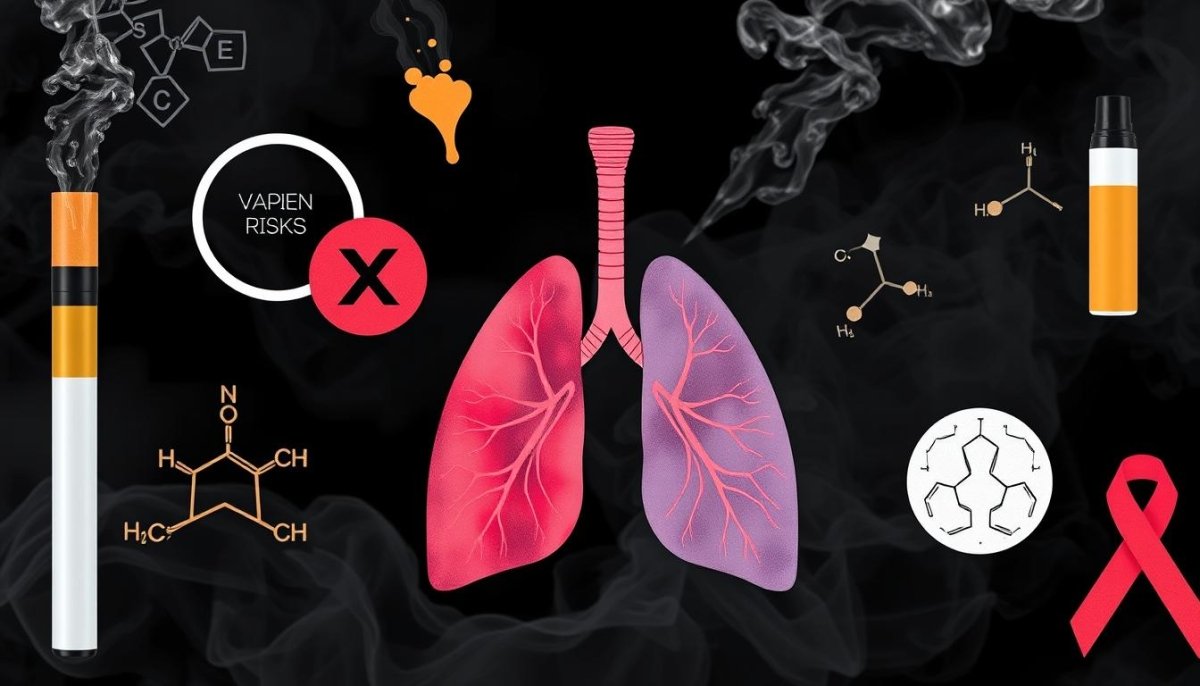Vaping's Effects: An Insightful Opinion

Vaping's Effects: An Insightful Opinion
Ever thought about the hidden health risks in e-cigarettes? These devices have changed a lot from when they first appeared in 2006. Now, there's a big debate about their health risks.
Electronic Nicotine Delivery Systems (ENDS) have become very popular in the UK. They're seen as a safer option than regular cigarettes. But, the real effects of vaping are not fully understood.
To understand vaping's effects, we need to look closely at its impact. This includes how it affects our lungs and any long-term health problems. The story of e-cigarettes is always changing, making us rethink how we see tobacco today.
Key Takeaways
- E-cigarettes entered global markets in 2006
- WHO officially recognised Electronic Nicotine Delivery Systems in 2009
- Vaping presents complex health considerations
- Ongoing research investigates possible risks
- Public awareness is key to grasping vaping's effects
Understanding Vaping and Its Popularity
Vaping has changed how people in the United Kingdom use nicotine. E-cigarettes are now seen as a new way to use nicotine, attracting both health experts and users.
Definition of Vaping
Vaping means breathing in and out vapour from an electronic cigarette. These devices heat a liquid with nicotine and flavours, making vapour. Unlike smoking, e-cigarettes don't burn anything.
Historical Context
E-cigarettes started to be popular in the UK about ten years ago. They have caused a lot of debate about if they can help people stop smoking.
- Introduced around 2010-2011
- Rapidly grew in consumer acceptance
- Viewed as a possible alternative to traditional cigarettes
Vaping vs. Traditional Smoking
Studies show vaping and smoking have different effects on health.
| Characteristic | Traditional Smoking | Vaping |
|---|---|---|
| Combustion | Involves burning tobacco | Heats liquid without burning |
| Chemical Exposure | Contains 7,000+ chemicals | Fewer identified chemicals |
| Health Risk Level | Extremely High | Potentially Lower |
Approximately 70% of smokers want to quit, making vaping a tempting option.
Even though vaping is getting more popular, experts say we need more research. The UK is taking a careful approach, seeing vaping's benefits but also keeping health standards high.
The Chemical Composition of Vaping Products
Vaping products have a mix of chemicals that need careful study. Knowing what's in them is key to understanding health risks and making rules.
Common Ingredients in E-liquids
E-liquids have a few main parts:
- Propylene glycol (PG)
- Vegetable glycerine
- Flavourings
- Nicotine (optional)
Herrington and Myers (2015) found about 60 to 70 compounds in e-liquids. Kucharska et al. (2016) found 113 chemicals in 50 e-liquid brands.
Health Risks Associated with Chemicals
| Chemical | Concentration Range | Potential Health Impact |
|---|---|---|
| Propylene Glycol | 0.4-98 g/100 g | Respiratory irritation |
| Glycerol | 0.3-95 g/100 g | Potential lung toxicity |
| Ethylene Glycol | Average 10 g/100 g | CNS toxicity risk |
Regulatory Standards in the UK
In the UK, vaping rules are strict. They require full chemical lists and safety checks. This helps reduce health risks.
Ongoing research continues to investigate the long-term implications of chemical exposure through vaping.
Impact of Vaping on Respiratory Health
Vaping is a growing concern for lung health. Studies show it could harm lung function over time. Medical experts are now focusing on how vaping affects our lungs.
Immediate Lung Effects
Vaping can harm our lungs right away. Experts have found several key issues:
- Increased inflammatory markers in lung tissue
- Potential alterations in lung homeostasis
- Risk of developing respiratory symptoms
Long-term Respiratory Consequences
Vaping can cause lasting lung damage. Research points to several serious long-term risks:
| Respiratory Condition | Potential Risks |
|---|---|
| Popcorn Lung | Linked to diacetyl in e-liquids, causing irreversible lung damage |
| Lipoid Pneumonia | Caused by inhaling oily substances, leading to chronic respiratory issues |
| Spontaneous Pneumothorax | Increased risk of lung collapse, mainly in younger patients |
Vaping and Asthma Research
The impact of vaping on asthma is worrying. Research shows e-cigarette users may face:
- Increased wheezing
- Higher risk of respiratory infections
- Potential worsening of asthma symptoms
"The long-term respiratory health implications of vaping remain a critical area requiring extensive scientific investigation." - Respiratory Health Research Institute
While more research is needed, current findings are alarming. The CDC reported over 2,800 cases of lung injury linked to vaping in 2019. This highlights the need for ongoing research into vaping's health effects.
Vaping and Mental Health
The link between vaping and mental health is a key area of study. Young adults often turn to e-cigarettes to cope with their mental health issues.
Effects on Anxiety and Depression
Research shows a strong link between vaping and mental health. A shocking 81% of young adults started vaping to ease anxiety and stress. Studies show that e-cigarette users face a higher risk of mental health problems:
- E-cigarette users are twice as likely to have depression
- Young adults with depression symptoms are 34% more likely to vape
- About 60% of vapers experience anxiety symptoms
The Role of Nicotine in Mood Regulation
Nicotine's role in mood is complex. While some see it as a stress-reliever, the truth is more complex. Vaping addiction can lead to a cycle of psychological dependence.
| Vaping Group | Anxiety Symptoms | Depression Symptoms |
|---|---|---|
| Nicotine-only Vapers | 60% | 50% |
| THC-only Vapers | 70% | 50% |
| Dual Vapers | 60% | 50% |
| Non-vapers | 40% | 25% |
Vaping as a Coping Mechanism
Many young adults see vaping as a way to escape their mental health issues. 4 out of 5 start vaping because of stress, anxiety, or depression. But, this strategy often makes mental health problems worse.
The idea that vaping is harmless for stress relief is very misleading.
It's vital to understand how vaping affects mental health. This knowledge helps in creating better support and preventing vaping's negative effects.
Vaping and Its Effect on Young People
The trend of vaping among teenagers is growing fast in the UK. It's a big worry for public health. Young people are getting more into e-cigarettes, facing health risks and addiction.
Trends Among UK Teenagers
More and more teens are vaping. The numbers are scary:
- Nicotine exposure peaks during critical brain development stages
- Many teenagers think vaping is safer than smoking
- Social media and marketing make vaping more appealing
Potential for Vaping Addiction
Vaping addiction is a big worry for young users. E-cigarettes can have as much nicotine as a whole pack of cigarettes. This can lead to quick addiction. Nicotine's effect on young brains is very concerning.
| Addiction Risk Factors | Impact on Teenagers |
|---|---|
| Nicotine Concentration | High addiction risk |
| Brain Development | Increased vulnerability |
| Social Influences | Normalisation of vaping behaviour |
Impact on Brain Development
Nicotine can harm brain development, which goes on until about age 25. The dangers include:
- Impaired cognitive function
- Reduced concentration abilities
- Potential long-term neurological consequences
The developing adolescent brain is very sensitive to nicotine's effects.
It's key for parents, teachers, and health experts to know these risks. They must protect young people from vaping addiction's harm.
Vaping and Heart Health
The link between vaping and heart health is a key area of study. As more people in the UK use e-cigarettes, it's vital to know how they affect our hearts.
Studies have shown how vaping can impact heart function. While e-cigarettes might be safer than regular cigarettes, they can cause heart problems.
Risks of Cardiovascular Issues
- Immediate heart rate increases of approximately 4 beats per minute
- Blood pressure elevation from 122/72 to 127/77 mm Hg
- Reduced heart rate recovery after physical activity
- Potential long-term vascular damage
Comparative Analysis with Traditional Smoking
| Measurement | E-Cigarette Users | Traditional Smokers | Non-Users |
|---|---|---|---|
| Heart Rate Reserve | 87% | 85% | 91% |
| Peak Metabolic Equivalents (METs) | 9.8 | 9.3 | 11.1 |
| Heart Rate Recovery | 25.2 bpm | 22.4 bpm | 28.1 bpm |
Research Findings
A University of Dundee study with 114 participants found important information. Switching to e-cigarettes from regular cigarettes improved blood vessel health in just one month.
"While e-cigarettes may present fewer risks than traditional smoking, they are not without possible heart problems," says Dr. Emma Richardson, a heart health expert.
The study highlights the dangers of vaping. E-cigarettes might be safer than regular cigarettes, but they're not completely safe. More research is needed to understand their long-term effects on our hearts.
Vaping and Oral Health Considerations
The world of oral health is changing with e-cigarettes becoming more popular. Dental experts are looking into the side effects and health risks of vaping.
Effects on Teeth and Gums
Research shows vaping can harm our teeth and gums. E-cigarette users face unique oral health problems:
- Increased risk of periodontal disease
- Reduced antioxidant capacity in saliva
- Potential development of gingivitis
"The oral health implications of vaping are complex and warrant careful investigation," noted dental researchers.
The Role of Flavourings
E-liquid flavourings add to the vaping health risks. Chemical compounds in these flavours can potentially damage oral cellular structures. This creates an environment for bacteria to grow and cause inflammation.
Dental Professionals' Perspectives
Dental experts advise caution with e-cigarettes. They note:
- E-cigarette users show less severe oral damage compared to traditional smokers
- Ongoing monitoring of long-term oral health effects is critical
- Potential improvements in periodontal conditions when switching from tobacco
With 39% of adults seeing e-cigarettes as harmful, awareness and research are growing. This helps us understand the emerging vaping health risks.
Vaping as a Smoking Cessation Tool
The world of quitting smoking has changed a lot with e-cigarettes. Vaping is now a good choice for those wanting to stop smoking.
Electronic cigarettes are helping smokers quit. Studies show vaping is very effective:
- You are roughly twice as likely to quit smoking using nicotine vapes compared to other replacement products
- Almost 66% of people using vapes with local Stop Smoking Service support successfully quit smoking
- E-cigarettes cost approximately one-third of traditional cigarette expenses
Effectiveness of Nicotine Replacement
UK health experts say vaping is much safer than smoking. In 2022, they found vaping is only a small part of the risks from cigarettes.
Success Stories and Challenges
Quitting smoking with vaping is not easy. But, many people have made it work. A 2021 study showed vaping can help you quit smoking up to 200% more than other methods.
Health Authorities' Recommendations
"E-cigarettes are significantly less harmful than traditional cigarettes and can be an effective cessation tool when used responsibly."
| Vaping Characteristic | Comparison to Smoking |
|---|---|
| Chemical Exposure | Far fewer toxins compared to cigarettes |
| Cost | Approximately 33% of smoking expenses |
| Cancer-Causing Chemicals | Significantly reduced risk |
Vaping is a good way to stop smoking, but health experts say use it wisely. They also advise against e-cigarettes for those under 18.
Public Perception and Social Acceptance of Vaping
In the United Kingdom, vaping rules and public views are complex. People's thoughts on e-cigarettes change over time. This is due to the media, personal stories, and studies on vaping vs smoking.
Attitudes Towards Vaping in the UK
Recent figures show interesting views on vaping. For example, 52% of young people know someone who vapes. This is more than the 47% who know someone who smokes. This shows a big change in how society sees nicotine.
- 44% of youth perceive peer approval of vaping
- 23% perceive peer approval of traditional smoking
- Vaping is increasingly seen as a more socially acceptable alternative
Influence of Media Representation
The media greatly affects how we see vaping. Studies show vaping is often seen as cool and for the young. Customisable nicotine contents and diverse flavours make it seem appealing.
Young people view e-cigarettes as resonating with their relationship to modern technology
Vaping in Social Settings
Vaping's social acceptance changes depending on where you are. Things like packaging, how it's seen as safer, and cost matter. Bright colours and "tobacco-free nicotine" labels make it seem less harmful.
Vaping laws also play a part in these social views. There's a lot of talk about where vaping is allowed and its health effects.
Environmental Effects of Vaping
Vaping has become very popular, but it poses big environmental challenges. Disposable e-cigarettes are a major problem for sustainability and waste in the UK.
Waste from disposable vapes is huge. In the UK, about 5 million disposable vapes are thrown away each week. That's around 8 vapes every second. It could fill 22 football pitches every year.
Disposable Vapes and Waste Challenges
The impact of disposable vapes goes beyond just how much waste they create. They are made of hard-to-recycle materials:
- Plastic components
- Copper elements
- Lithium batteries
In 2022, over 40 tonnes of lithium were wasted in the UK from disposable vapes. That's enough for 5,000 electric vehicle batteries.
Concerns About E-liquid Spillage
E-liquids also pose environmental risks. They contain harmful chemicals that can pollute water and harm aquatic life. Vaping laws need to protect our environment from these dangers.
| Waste Metric | Annual Impact |
|---|---|
| Disposable Vapes Discarded | 260 Million |
| Lithium Wasted | 40 Tonnes |
| Potential Recycling Uses | Up to 300 Uses Per Device |
Initiatives for Sustainability
More people are becoming aware of the need for change. By January 2024, nearly 250,000 people wanted disposable vapes banned in the UK. There's a growing push for sustainable vaping to reduce harm to the environment.
"The environmental cost of convenience must be carefully evaluated against long-term ecological impacts."
Now, we must also consider the environmental impact of vaping. It's part of addressing health risks.
Future of Vaping Regulations in the UK
The UK's vaping rules are changing a lot. New laws aim to stop vaping among teens and protect public health.
The UK government is taking big steps to control vaping. They've set up new rules to keep people safe and reduce risks.
Current Legislative Framework
Vaping laws are getting tougher. The Tobacco and Vapes Bill, launched on 20 March 2024, is a big step for health policy.
- New on-the-spot fines of £100 for selling vapes to underage individuals
- Maximum court-imposed fine of £2,500 for violations
- £30 million annual budget for enforcement
Proposed Changes and Implications
The government wants to stop vaping among young people. They plan to:
- Ban disposable vapes from 1 June 2025
- Start a new tax on vaping products from 1 October 2026
- Charge £2.20 per 10ml of vaping liquid
Stakeholder Perspectives
The goal is to protect our youth from the dangers of vaping.
| Age Group | Vaping Statistics |
|---|---|
| 11-17 years | Nearly 8% vaped in April 2023 |
| 16-24 years | Highest vape use rate at 16% |
Over 28,000 people shared their thoughts on the new rules. Most, 63.2%, support the plan to keep vaping away from young people. These laws aim to protect everyone's health and tackle the issue of vaping among teens.
Conclusion: Weighing the Impact of Vaping
Vaping health risks are complex and not fully understood. E-cigarettes have fewer harmful chemicals than regular cigarettes. But, they can cause serious health problems. It's important to know the effects of vaping for everyone's health.
Young people face big vaping health risks. Over 80% of e-cigarette poison calls are about kids under five. This shows we need strict rules and for parents to be aware. Nicotine addiction is a big worry, with kids getting hooked even before they start vaping regularly.
Summary of Key Findings
Studies show vaping can change your body in bad ways. It can make your heart beat faster and change how you breathe. It might also irritate your lungs. Nicotine is addictive, and flavoured e-cigarettes are easy to get. This is bad for kids' health.
Final Thoughts on Health and Policy
Lawmakers must focus on research and strong safety measures. The vaping industry's big money should not ignore health risks. We need more science and clear talks to understand vaping's effects on health.
Call to Action for Public Awareness
Everyone should learn about vaping's dangers. Parents, teachers, and doctors need to work together. They should teach kids about e-cigarette risks and encourage them to make healthy choices.
FAQ
What exactly is vaping?
Vaping means inhaling and exhaling vapour from an electronic cigarette or similar device. Unlike regular cigarettes, these devices heat a liquid with nicotine and flavourings. This creates vapour that users breathe in.
Are e-cigarettes safer than traditional cigarettes?
E-cigarettes are seen as less harmful than regular cigarettes. They have fewer toxic chemicals. But, they are not completely safe and can cause health problems like lung and heart issues.
Can vaping help me quit smoking?
Some studies show e-cigarettes can help people stop smoking. But, the UK's health experts say to talk to a doctor first. They recommend a full plan to quit smoking.
What are the primary health risks associated with vaping?
Vaping can harm your lungs and heart. It can also lead to nicotine addiction. Young people's brains are at risk, too. Long-term effects are being studied, but the dangers are clear.
Is vaping addictive?
Yes, e-cigarettes often have nicotine, which is addictive. Even low-nicotine products can cause dependency. Young people are more likely to get addicted because their brains are more open to it.
Are there age restrictions for purchasing vaping products in the UK?
In the UK, you must be 18 or older to buy e-cigarettes or e-liquids. Shops must check your age and can't sell to minors.
What chemicals are typically found in e-liquids?
E-liquids usually have propylene glycol, vegetable glycerine, nicotine, and flavourings. Some may have harmful chemicals like formaldehyde and acrolein when heated.
How does vaping impact mental health?
Nicotine can change your mood and make anxiety and depression worse. Some users might feel stress relief at first. But, long-term use can lead to mental health problems and addiction.
What environmental concerns are associated with vaping?
Disposable e-cigarettes and cartridges create a lot of waste. If not disposed of properly, they can pollute soil and water. The production and disposal of these devices harm the environment.
How are vaping regulations evolving in the UK?
The UK keeps updating vaping rules based on new research and health concerns. They focus on stopping marketing to young people, ensuring product safety, and managing health risks.






